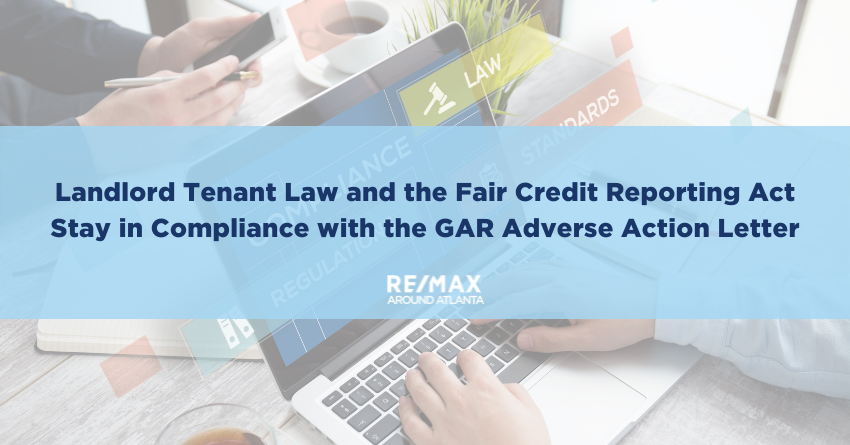|
If you use consumer reports to make tenant decisions, you must comply with the Fair Credit Reporting Act (FCRA). The Federal Trade Commission (FTC) enforces the FCRA. Tenant background checks can include a variety of information, including rental and eviction history, credit, income or criminal records. If you take any action that is unfavorable to the interests of a rental applicant or tenant based on information in a consumer report, then you should send an adverse action. GAR Form F904 Adverse Action Regarding Rental Application is written to be compliant with the FCRA denial situations and is very easy to complete. Please remember it if you are ever in the position of denying a rental application or requiring a co-signer, additional security deposit or additional rent. The Adverse Action Notice provides proof of FCRA compliance and can provide support in the event of a complaint of discrimination.
What is a Consumer Report? A consumer report may contain information about a person’s credit characteristics, rental history, or criminal history. Consumer reports are prepared by a CRA — a business that assembles such reports for other businesses—and are covered by the FCRA. Examples of these reports include:
You can only obtain a consumer report if you have a permissible purpose. Landlords may obtain consumer reports on applicants and tenants who apply to rent housing or renew a lease. You may obtain written permission from applicants or tenants to show that you have a permissible purpose. You must certify to the company from which you are getting the consumer report that you will only use the report for housing purposes. You may not use the consumer report for another purpose. It’s also a good idea to review other applicable federal and state laws related to consumer reports. For example, a blanket policy of refusing to rent to anyone with a criminal record may violate the Fair Housing Act. What is an Adverse Action? An adverse action is any action by a landlord that is unfavorable to the interests of a rental applicant or tenant. Examples of common adverse actions by landlords include:
If you reject an applicant, increase the rent or deposit, require a co-signer, or take any other adverse action based partly or completely on information in a consumer report, you must give the applicant or tenant a notice of that fact – orally, in writing, or electronically. GAR F904 Adverse Action Letter Regarding Rental Application is proper Notice. An adverse action notice tells people about their rights to see information being reported about them and to correct inaccurate information. The notice must include:
While oral adverse action notices are allowed, written notices provide proof of FCRA compliance. Take the Case of... A landlord or the landlord’s agent who orders a consumer report from a CRA. Information contained in the report leads to further investigation of the applicant. The rental application is denied because of that investigation. Since information in the report prompted the adverse action in this case, an adverse action notice must be sent to the consumer. A person with an unfavorable credit history, like a bankruptcy, but no other negative indicators, who applies for an apartment. Rather than deny the application, the landlord or the landlord’s agent offers to rent the apartment, requiring a security deposit that is double the normal amount. The applicant is entitled to an adverse action notice because the credit report influenced the landlord’s decision to require a higher security deposit from the applicant. A landlord or the landlord’s agent who hires a reference checking service to verify information included on a rental application. Because the service reports that the applicant does not work for the employer listed on the application, the rental application is denied. The applicant is entitled to an adverse action notice. The report is a consumer report from a CRA (the agency checking the references provided by the consumer on the application), and its report influenced the landlord’s decision to deny the application. A landlord or the landlord’s agent who makes it a practice to approve an application if the prospective tenant shows an adequate income or has a favorable credit report, is dealing with an applicant who has an inadequate income and a bad credit report. The applicant is entitled to an adverse action notice because the credit report influenced the denial, even though income was another factor. A landlord or the landlord’s agent who orders a criminal history report on a prospective tenant. Because the report shows that the applicant has a felony conviction, the landlord denies the rental application. The applicant is entitled to an adverse action notice. The report is a consumer report and it influenced the landlord’s decision to deny the application. INVESTIGATIVE REPORTS Landlords who use "investigative reports" – reports based on personal interviews concerning a person's character, general reputation, personal characteristics, and lifestyle – have additional obligations under the FCRA. These obligations include giving written notice that you may request or have requested an investigative consumer report, and giving a statement that the person has a right to request additional disclosures and a summary of the scope and substance of the report. (See 15 U.S.C. section 1681d(a), (b)). DISPOSING OF CONSUMER REPORTS When you're done using a consumer report, you must securely dispose of the report and any information you gathered from it. That can include burning, pulverizing, or shredding paper documents and disposing of electronic information so that it can't be read or reconstructed. For more information, see Disposing of Consumer Report Information? Rule Tells How.
0 Comments
Leave a Reply. |
RMAAReal Estate News, Brokers Blog & More Categories
All
Archives
July 2024
|


 RSS Feed
RSS Feed